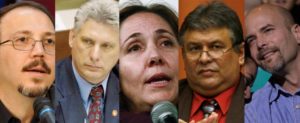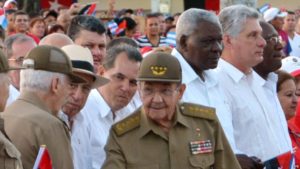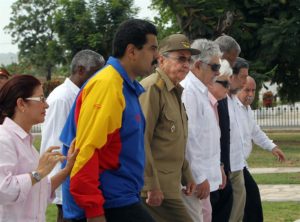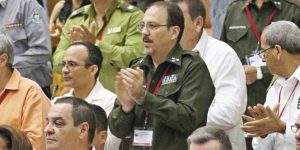Should all happen as expected, February 24th 2018 will be a momentous day in the lives of many Cubans. On that day, 10 years after officially taking over from his brother Fidel, President Raúl Castro has promised to step down from power, marking the first time that many on the island will have ever known a head of state without his famous last name.
This is not lost on the Cuban authorities. The all-encompassing Cuban state has been preparing for the moment since 2013, when Raúl first announced his intention to step down. There is little doubt that the handover of power will be carefully choreographed in public, the ruling Cuban Communist Party (PCC) seeking to demonstrate that running the country will be business as usual.
This will do little to stop the chatter, however, especially around the big question that a Castro-less Cuba automatically entails: what are the prospects for political and economic reform on the island? The easy answer is that in the immediate term, probably very little will change. The real answer to this question is more complex. Raúl’s eventual successor, the state of the economy, social pressures, and—perhaps in time—relations with the US, will all play significant roles in defining it. Inevitably, little will be resolved until Raúl has actually left the presidency.
Perceived wisdom has the non-military technocrat Miguel Díaz Canal as Raúl’s most likely successor. In his 50s, Díaz Canal would mark a clear break from the Castro-led generation of revolutionary figures who have dominated Cuban politics over the last six decades. He has also been central to Cuba’s baby steps towards a more-market based economy.
What will Follow?
However, the fact that his name comes up so readily in discussion over successors does leave some pause for thought. The Cuban regime has historically played its cards close to its chest, with few really privy to the thoughts of the key decision-makers at its apex. It would be little surprise if Díaz Canal’s presumed coronation next year turns out to be a smokescreen for a different candidate altogether.
Even if Díaz Canal is the man to step forward, what power – or indeed desire – will he genuinely have to call his own shots and take Cuba down a more liberal path? The military old guard, led by the likes of Raúl and José Ramón Machado Ventura, current second secretary in the PCC, will almost certainly retain residual authority behind the scenes. Despite Raúl’s technocratic bent, many others in the old guard have been less enthusiastic about recent steps to liberalize elements of the economy. Without a Castro in charge, and the perception of a more pliable president in Díaz Canal in his place, opposition to further change could become stronger.
That points to the truth that there are divisions within the PCC over the country’s future direction. But these divisions are not big enough that they obscure the party’s common goal – to retain power and to retain control of its destiny. Technocrat and non-military he may be, but Díaz Canal is almost certainly first and foremost a loyal cadre of the PCC. It would be foolish to believe that he is automatically an agent for political change just because he is not a Castro or is part of a younger generation of leaders.
It’s the economy, stupid
In fact, the performance of the economy and the Cuban state’s (in)ability to maintain its basic social contract with the population are the most likely portents of future structural changes. In almost any scenario, there is little real prospect of the regime rolling back the tentative economic reforms of recent years; all but the most blind ideologues have come to realize that the state simply lacks the resources to manage all facets of the economy. Although still controlled, pockets of private enterprise and foreign investment will grow in time.
But there is little doubt that the economy is facing significant pressure as its main sponsor, Venezuela, implodes. The Cuban economy contracted by 0.9% in 2016 as Venezuela cut oil exports to the island and Cuba’s export of human capital in the other direction—mainly in the form of doctors and nurses—was severely curtailed. Efforts to attract increased foreign direct investment have been tortuously slow in their execution. Should these patterns continue (and there is little sign of Venezuela, in particular, picking up soon), the strain of government finances will begin to become critical.
It also matters in the context of increasingly visible inequality and regional divides. Different classes are emerging: particularly among those who have access to foreign exchange, whether through their jobs or through family overseas, and those who do not. The latter continue to survive within the limited confines of the local economy. These differences are intensified between rural and urban areas – the bustling capital of Havana is increasingly a focal point of the ‘haves’, the countryside that of the ‘have-nots’.
The challenge ahead
This ultimately is the key challenge that the Cuban government faces ahead of the presidential transition and beyond. Hand over the economy in a resilient condition and on Cuba’s own terms, and Castro’s successor has greater scope for ignoring the still small demands on the island for political change. A fractured economy and a failing social contract, on the other hand, spell difficulties ahead.
This would not necessarily play out in the form of widespread unrest or immediate calls for political freedoms— there remains little overt support to sustain such moves. But, perhaps more dangerously to the PCC, it would result in a deeper sense of public disillusionment with a state that has failed to deliver its promises. Without a Castro safety net to fall back on, the foundations of a grassroots reform movement can emerge.
A business boom?
Businesses hoping for a Caribbean China or Vietnam to appear a year from now will be disappointed. The conditions will not be ripe for a mass opening of the Cuban market, yet. Díaz Canal, or whoever Castro’s successor proves to be, will almost certainly continue along the current Cuban path to reform, with greater or lesser urgency dictated by the economic situation. But the regime remains fearful of opening too fast, too soon, for the impact they perceive it would have on social unity, and ultimately on the PCC’s ability to remain in control.
This will slowly bring more opportunities for the discerning investor, but realities of doing business will remain complex. The Cuban regime will remain slow in its decision-making and continue to bind investors in reams of red tape. Meanwhile, the US embargo—unlikely to be lifted this year or the next—will continue creating legal obstacles for US and foreign companies alike. Although 2018 brings hope for a brighter future in the longer term, in the meantime, the Castros’ shadow will linger over Cuba. Those thirsty for a Cuba libre, economically and politically, will need to wait a while longer to be refreshed.
(Opinión) Cuba: Que se espera después del retiro de Raúl Castro en Febrero 2018?.
Si todo sucede como se esperaba, el 24 de febrero de 2018 será un día trascendental en la vida de muchos cubanos. Ese día, diez años después de haber asumido oficialmente el poder de su hermano Fidel, el presidente Raúl Castro prometió renunciar al poder, lo que marca la primera vez que muchos en la isla han conocido a un jefe de Estado sin su famoso apellido.
Esto no se pierde en las autoridades cubanas. El total estado cubano se ha estado preparando para el momento desde 2013, cuando Raúl anunció por primera vez su intención de dimitir. No hay duda de que la entrega del poder será cuidadosamente coreografiada en público, el gobernante Partido Comunista de Cuba (PCC) que busca demostrar que el funcionamiento del país será un negocio como siempre.
Sin embargo, esto no hará nada para detener la conversación, especialmente en torno a la gran pregunta que una Cuba sin Castro implica automáticamente: ¿cuáles son las perspectivas de reforma política y económica en la isla? La respuesta fácil es que en el término inmediato, probablemente muy poco cambiará. La respuesta real a esta pregunta es más compleja. El eventual sucesor de Raúl, el estado de la economía, las presiones sociales y, quizás en el tiempo, las relaciones con los Estados Unidos, desempeñarán todos un papel importante en su definición. Inevitablemente, poco se resolverá hasta que Raúl haya dejado la presidencia.
La sabiduría percibida tiene al tecnócrata no militar Miguel Díaz Canal como el más probable sucesor de Raúl. En los cincuenta, Díaz Canal marcaría una clara ruptura con la generación dirigida por Castro de figuras revolucionarias que han dominado la política cubana en las últimas seis décadas. También ha sido central en los pequeños pasos de Cuba hacia una economía más basada en el mercado.
¿Qué seguirá?
Sin embargo, el hecho de que su nombre aparezca tan fácilmente en la discusión sobre los sucesores deja una cierta pausa para el pensamiento. El régimen cubano ha jugado históricamente sus cartas cerca de su pecho, con pocos realmente al tanto de los pensamientos de los principales tomadores de decisiones en su ápice. No sería de extrañar que la presunta coronación de Díaz Canal el próximo año resultara ser una cortina de humo para un candidato diferente por completo.
Incluso si Díaz Canal es el hombre que debe dar un paso adelante, ¿qué poder o, de hecho, deseo- tendrá que llamar realmente a sus propios tiros y tomar a Cuba por un camino más liberal? La antigua guardia militar, encabezada por Raúl y José Ramón Machado Ventura, actual segunda secretaria del PCC, casi seguramente conservará la autoridad residual entre bastidores. A pesar de la inclinación tecnocrática de Raúl, muchos otros en la vieja guardia se han mostrado menos entusiasmados con los recientes pasos para liberalizar elementos de la economía. Sin un Castro a cargo, y la percepción de un presidente más flexible en el Canal Díaz en su lugar, la oposición a nuevos cambios podría ser más fuerte.
Eso apunta a la verdad de que hay divisiones dentro del PCC sobre la dirección futura del país. Pero estas divisiones no son lo suficientemente grandes como para ocultar el objetivo común del partido: retener el poder y retener el control de su destino. Tecnócrata y no militar, pero Díaz Canal es casi seguramente un cuadro leal del PCC. Sería absurdo creer que él es automáticamente un agente para el cambio político sólo porque no es un Castro o es parte de una generación más joven de líderes.
Es la economía, estúpido
De hecho, el desempeño de la economía y la capacidad (en) del Estado cubano de mantener su contrato social básico con la población son los signos más probables de futuros cambios estructurales. En casi cualquier escenario, hay pocas perspectivas reales de que el régimen haga retroceder las tentativas de las reformas económicas de los últimos años; Todos menos los ideólogos más ciegos se han dado cuenta de que el Estado simplemente carece de los recursos para manejar todas las facetas de la economía. Aunque todavía están controlados, los bolsillos de la empresa privada y la inversión extranjera crecerán en el tiempo.
Pero hay pocas dudas de que la economía está enfrentando una presión significativa como su principal patrocinador, Venezuela, implosiona. La economía cubana se contrajo un 0,9% en 2016, cuando Venezuela cortó las exportaciones de petróleo a la isla y la exportación de Cuba de capital humano en otra dirección -principalmente en forma de médicos y enfermeras- fue severamente reducida. Los esfuerzos para atraer una mayor inversión extranjera directa han sido tortuosamente lentos en su ejecución. Si estos patrones continúan (y hay pocas señales de que Venezuela, en particular, se acerque pronto), la tensión de las finanzas públicas comenzará a ser crítica.
También es importante en el contexto de una desigualdad cada vez más visible y de divisiones regionales. Diferentes clases están surgiendo: particularmente entre aquellos que tienen acceso a divisas, ya sea a través de sus empleos oa través de la familia en el extranjero, y los que no tienen. Estos últimos siguen sobreviviendo dentro de los límites limitados de la economía local. Estas diferencias se intensifican entre las zonas rurales y urbanas: la bulliciosa capital de La Habana es cada vez más un punto focal de los “ricos”, el campo de los “pobres”.
El reto por delante
Este último es el desafío clave que el gobierno cubano enfrenta antes de la transición presidencial y más allá. Entregue la economía en una condición resiliente y en los propios términos de Cuba, y el sucesor de Castro tiene mayor posibilidad de ignorar las exigencias todavía pequeñas de la isla para el cambio político. Una economía fracturada y un contrato social que falla, por otro lado, significan dificultades por delante.
Esto no necesariamente se llevaría a cabo en forma de disturbios generalizados o de llamamientos inmediatos a libertades políticas – todavía queda poco apoyo abierto para sostener tales movimientos. Pero, quizás más peligrosamente para el PCC, daría lugar a un sentido más profundo de la desilusión pública con un estado que no ha cumplido sus promesas. Sin una red de seguridad castrista a la que recurrir, los cimientos de un movimiento de reforma popular pueden surgir.
¿Un auge empresarial?
Las empresas que esperan que una China del Caribe o Vietnam aparezcan dentro de un año estarán decepcionadas. Las condiciones no estarán maduras para una apertura masiva del mercado cubano, sin embargo. Díaz Canal, o quien sea el sucesor de Castro, seguramente seguirá por el actual camino cubano a la reforma, con mayor o menor urgencia dictada por la situación económica. Pero el régimen sigue temeroso de abrirse demasiado rápido, demasiado pronto, porque el impacto que perciben que tendría sobre la unidad social y, en última instancia, sobre la capacidad del PCC para mantenerse en control.
Esto lentamente traerá más oportunidades para los inversionistas más exigentes, pero las realidades de hacer negocios seguirán siendo complejas. El régimen cubano seguirá siendo lento en su toma de decisiones y continuará obligando a los inversionistas en lentos trámites burocráticos. Mientras tanto, el embargo estadounidense -que probablemente no será levantado este año o el próximo- continuará creando obstáculos legales tanto para empresas estadounidenses como extranjeras. Aunque 2018 trae esperanza para un futuro más brillante a largo plazo, mientras tanto, la sombra de los Castros se mantendrá en Cuba. Los sedientos de una Cuba libre, económica y políticamente, tendrán que esperar un poco más para ser complacidos.
Agencies/Forbes/Simon Whistler/ Internet Photos/ Extractos/ Arnoldo Varona/ TheCubanHistory.com
THE CUBAN HISTORY, HOLLYWOOD.













